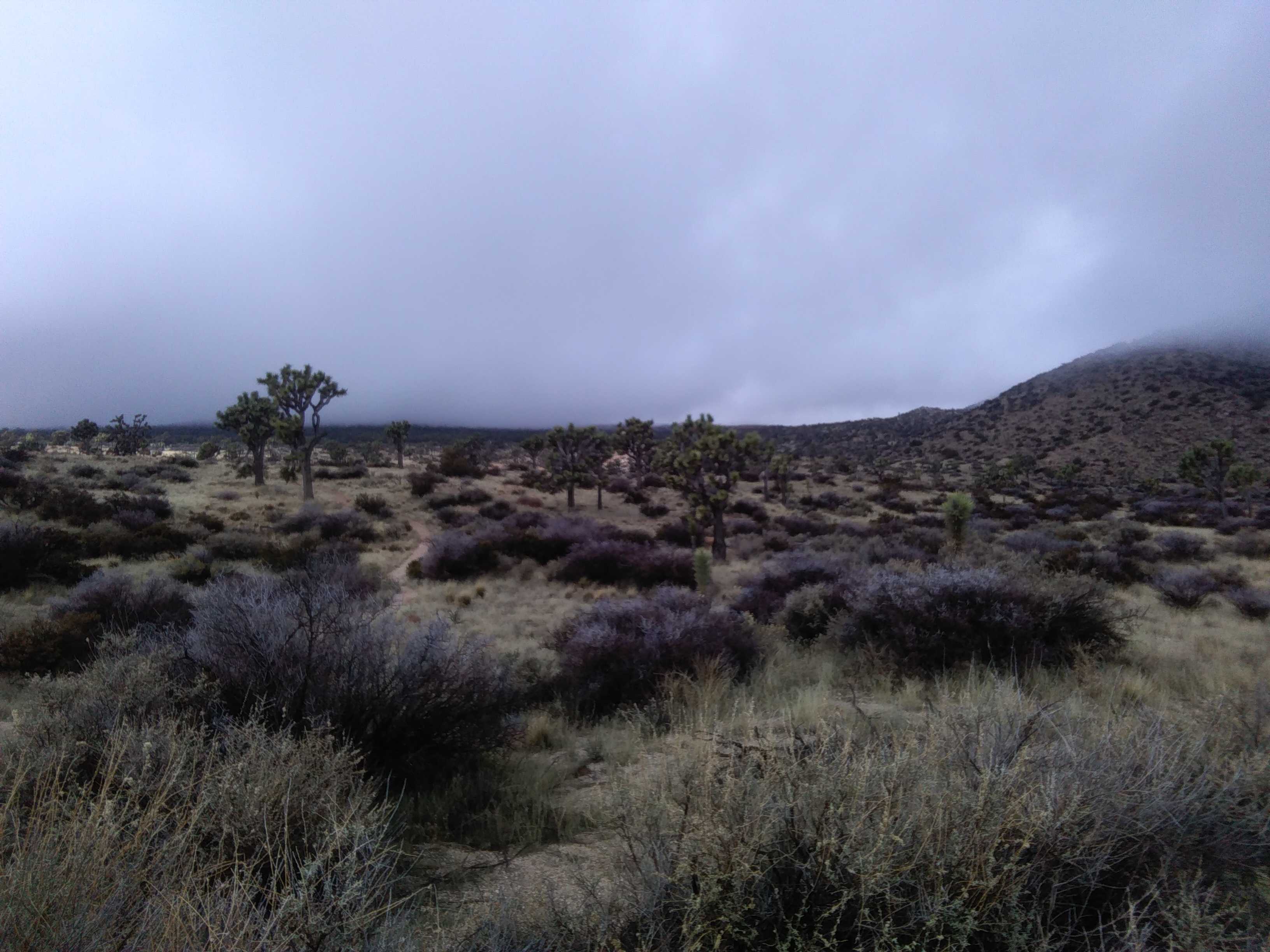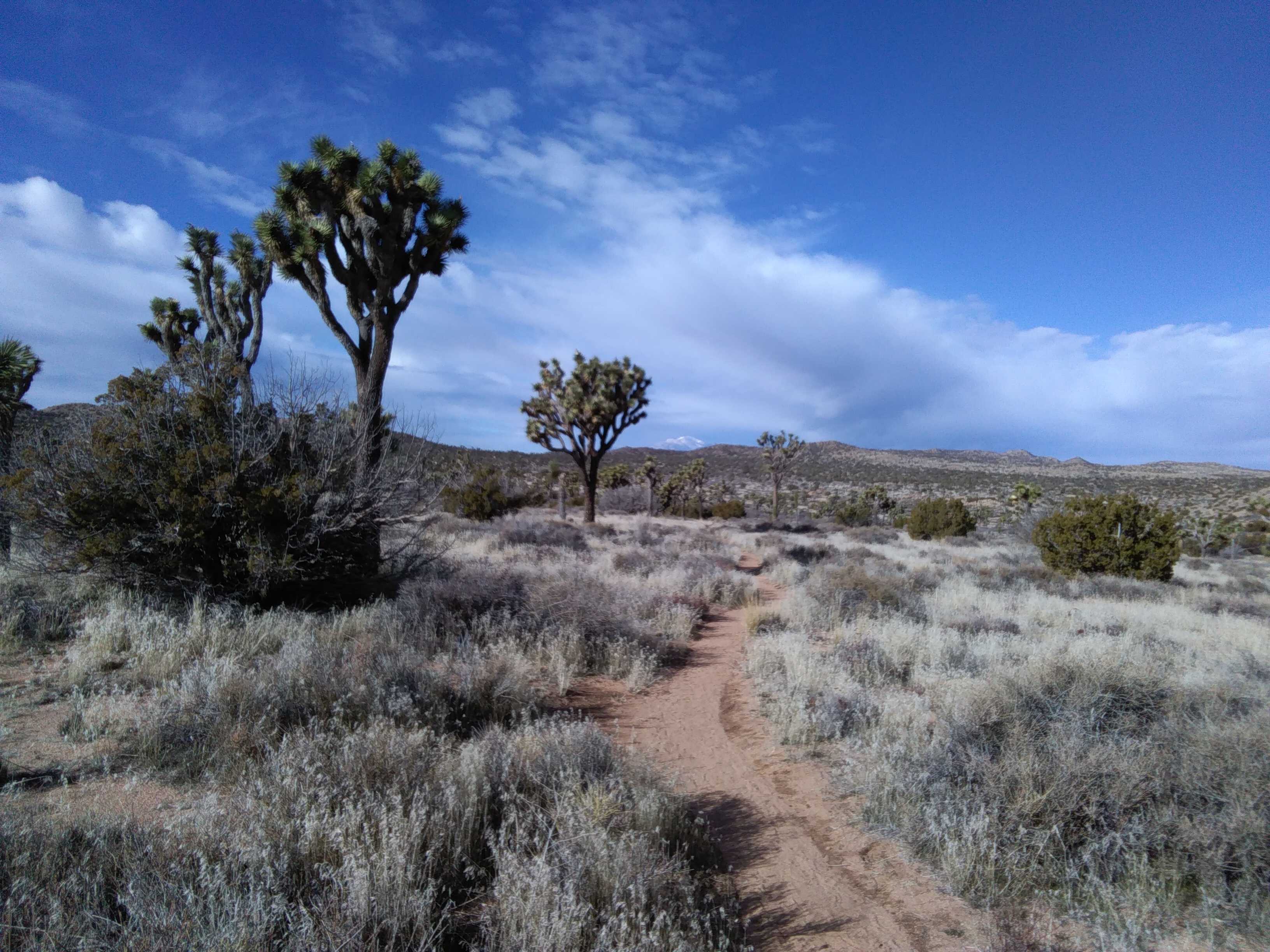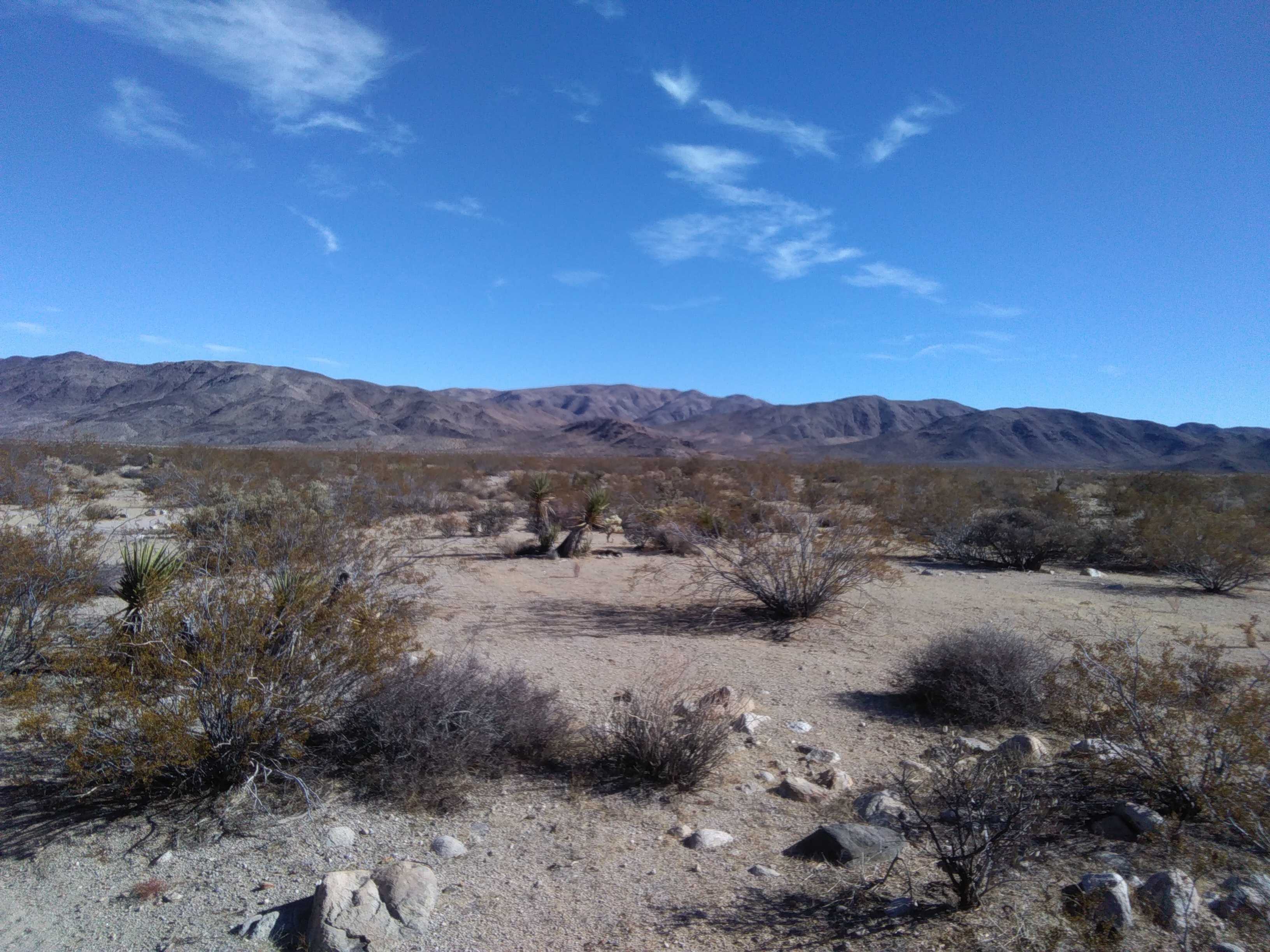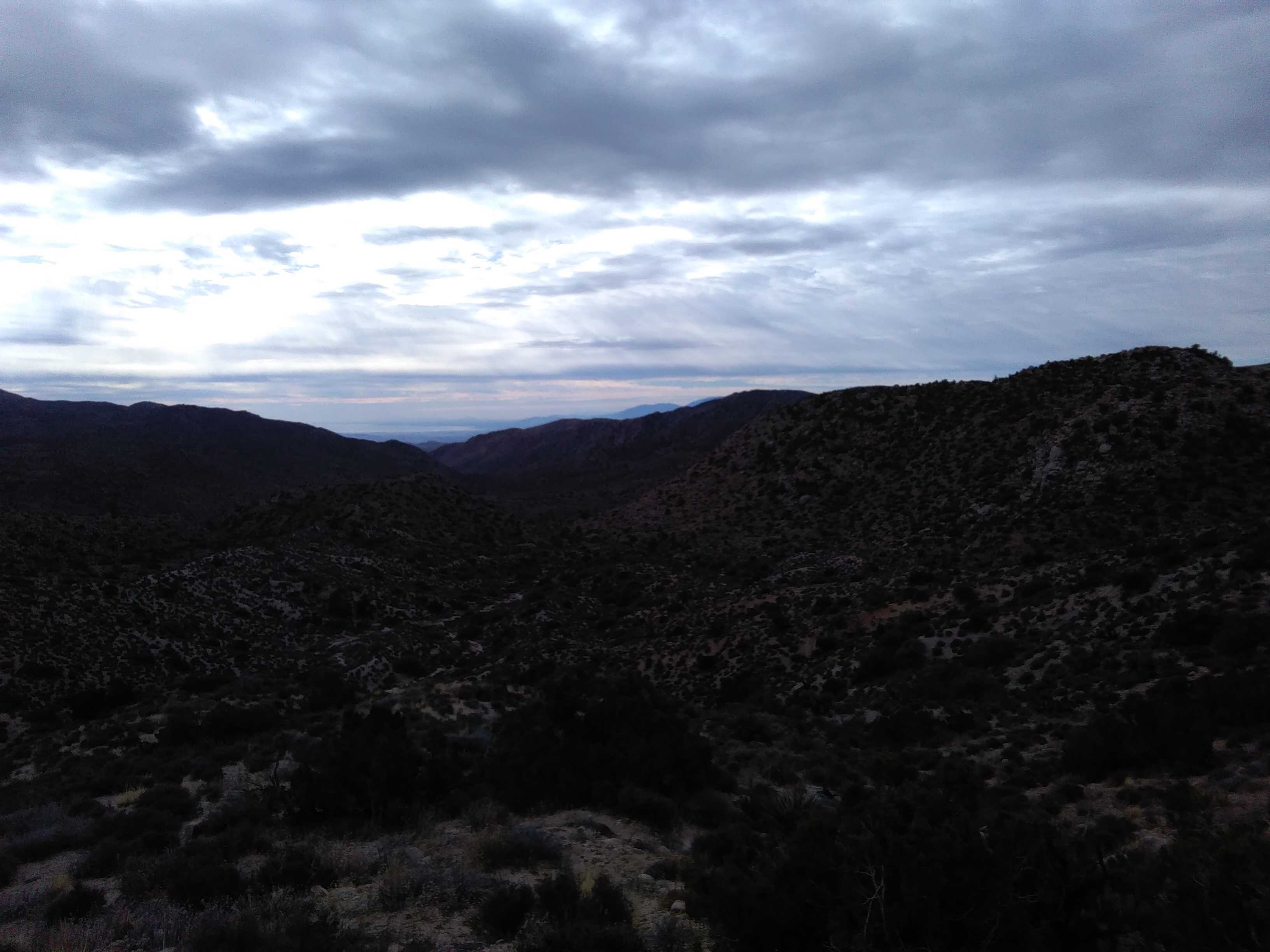California Riding and Hiking Trail
January 2024
The desert is an acquired taste. It is usually either too cold or too hot. Too windy or not breezy enough. Too sunny or too soaked with rain. Rarely, if ever, are conditions just right. Because of its temperamental nature, the desert is usually not crowded. Desert solitude. Joshua Tree National Park—and its three million annual gawkers—may at first seem like an exception to this rule, but once the intrepid hiker or climber ventures more than a couple miles from the nearest paved road, the rule of desert solitude presents itself once again.
I was down in San Diego visiting in-laws over the new year when I decided to hike a yo-yo of the California Riding and Hiking Trail. A couple nights under the forlorn desert moon was just what I needed after spending two weeks with family. And so I set off for Joshua Tree, despite rain in the forecast, before the sun showed any signs of rising. I arrived at Black Rock Canyon at 8 a.m. and packed my bag with warm clothes, food, and enough water to last me for a couple days. Shortly after I set out tramping, rain began beating down. I put on my rain gear, but unfortunately had no trash bag to act as a pack liner, and so the gear in my bag didn’t stay completely dry. Nor was my “rain gear” actually waterproof enough to keep me from getting soaked and chilled to the bone within thirty minutes of the onslaught.
The desert reminded me of her cruel temperamentality by turning rain to snow while I ascended Black Rock Canyon. I chuckled at my bad luck (or refusal to reschedule my trip), but kept hiking nonetheless. Eventually, I made it to the head of the canyon, and paralleled an old dirt road for some miles. A small trailhead sign provided the slightest of protection from the steady snow. I stood under it for some time, pondering my predicament, shivering fiercely all the while. I decided to pitch my tarp, jump into my sleeping bag, and try to warm up. It was tricky to keep my already damp gear from getting soaked, but I managed to get in my bag, eat some food, and rest for thirty minutes. The snow eventually stopped. I triumphantly packed my bag with numb hands and cracked on.

While high in elevation—much of it over 5,000 feet—the park offers surprisingly little in the way of big elevation gains and losses. I made short work of the miles, as the largest climbs were never more than 500 feet at a time. I made it to Ryan Camp well before sunset, and the bustling multitude of hikers, climbers, driver, gawkers, and vacationers I was confronted with gave me unease. So I pushed on, back into the quiet isolation of the Little San Bernardino Mountains. Quiet, at least, in terms of people. Gusty winds started to set in around sunset and stubbornly persisted all night. But it was dry and I found a nice spot to set up camp for the night. I put on all my clothes, got in my sleeping bag, and put my feet in my empty backpack for a little extra warmth. I slept well.
The next morning, I walked twelve brisk miles to the trail’s eastern terminus. The terrain was mostly flat or slightly downhill, making for swift travel. Joshua Trees peppered the landscape, and large rock formations loomed menacingly all over. At the eastern terminus, I ate greedily and assessed my water situation. I would be out for another full night and day and I had a little over three liters. I could either hitch to town to fill up or make do. I decided to make do.

I turned around and began to retrace my steps, 37.5 miles back to the western terminus. I don’t mind out-and-backs. You see everything from literally a different perspective, and I find that my mental state changes drastically day-to-day on short trips such as this. So the hike back was an entirely distinct experience from the hike there.
The only complication on the way back was having lost my hat and having to walk with the sun beaming photons relentlessly at my face all day. I was hiking west now, so I got no respite from its afternoon rays until dusk. Where the hell was my hat? I lived in my 1999 Toyota Sienna for three years, and during this time I pared down my belongings to strictly the essential. I had one spork, one knife, one pan, one pot, one good jacket, one pair of glasses. One hat. One would think that living in this stripped down state of affairs would make you less of a materialist. I discovered exactly the opposite to be true. I discovered that we do, in fact, need things and when all you have is more or less essential, it is a great practical and emotional disturbance to find one of these things suddenly missing. A lot of people parade the fact that they aren’t materialists. But I think these people just have so much stuff that it doesn’t matter if they lose some of it. When you have twenty spoons in your kitchen, what is one measly spoon worth to you. We are all necessarily materialist to some extent. It’s not a bad thing. It’s just a fact of nature. My hat served an essential function to me. Spending just one day without it out in Joshua Tree was a brutal reminder of how dear that hat was to me. That night I found it buried at the bottom of my pack. I was well pleased with this discovery.
The second night was windier than the first, but I slept well nonetheless. I woke up around 7 a.m. the next morning and hiked on achey feet towards the car. The weather was chilly and made more-so by a persistent headwind. At one point, the wind stopped, the sun peeked out from behind some clouds, and all was still. Perhaps the finest gift of the desert is that since conditions are almost always bad, even a minute of calm is the most wonderfully sublime minute one could ask for. The wind dies down. You breathe in the cold air that almost burns your nostrils with its purity. You hear nothing but the soft coo of a hearty desert bird. You see the stoic, uncomplaining desert plants. You can sense that stubborn will to live of every desert being around you. Yes, this is the gift of the desert. It is one that you don’t come to know until you spend many freezing nights, many burning days, many parched hours looking for an unlikely spring year over year out there. This is why you usually have the desert to yourself. But those who you do see out there, way out there, share the secret knowledge of this gift from God with you.


The wind did not allow this sublimity to last for long. It whipped up some sand and threw it in my face as a reminder that this peace in the desert can never last long. I trekked back to the car, making good time. I popped a few large blisters on my feet, dried and organized my gear, and headed back to San Diego for a few more days with the in-laws. I am glad to have started the year with a romp in the Mojave Desert, which, despite its prickliness—or perhaps because of it—keeps calling me back.